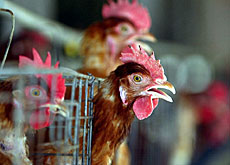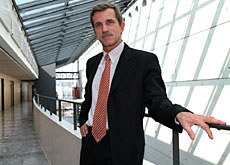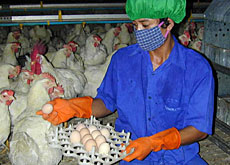Swiss react to bird flu pandemic warning

The Federal Health Office says it is taking very seriously a World Health Organization warning of a potential pandemic stemming from bird flu.
The WHO said on Wednesday that the international community should do more to control the spread of the disease, which has already killed 42 people in southeast Asia.
Shigeru Omi, a senior health official at the WHO, told a bird flu conference in Vietnam that the world was “now in the gravest possible danger” of a pandemic.
Omi said that the world normally had a pandemic every 20 or 30 years, but that it had been 40 since the last one – making a human flu pandemic very likely.
The “versatile and resilient” avian flu virus that swept through large parts of Asia at the end of 2003 would be the source of the next one without action by the international community, added Omi.
Frédéric Eynard, of the Swiss Federal Health Office, said that they took the WHO’s comments very seriously.
“We can confirm that there could be a pandemic, but we can’t say when,” Eynard told swissinfo.
“Switzerland is continuing its work in this domain. We realise that it’s a problem that’s difficult to eradicate,” he said, adding that the office had been working on bird flu for several years.
Worst case scenario
Eynard said using estimations based on the Spanish flu pandemic – the biggest pandemic known so far with up to 50 million deaths in 1918 – the Federal Health Office would envisage 42,000 deaths in “the worst-case scenario” pandemic.
On top of this would be two million medical consultations and 14,000 cases of hospitalisation.
Eynard said an Interior Ministry working group, made up of health office officials, cantonal representatives and flu experts, had been established to work out strategies to combat influenza.
Its work includes surveillance of “normal” influenza, vaccination campaigns and preventative measures.
Eynard confirmed that the group had a pandemic action plan, which was being continually adapted to take account of the latest developments.
No vaccine
Anti-viral drugs exist for normal flu, but there is no vaccine for the human form of avian flu.
Last year, at the height of the bird flu outbreak, Switzerland took precautionary measures including banning animal feed, meat and eggs from infected countries. It also made antiviral drug stockpiles and mounted a poster campaign at Swiss airports.
The WHO says that recent outbreaks in southeast Asia have shown a more deadly strain than the original one detected in Hong Kong in 1997, making the situation more urgent.
Experts have already warned that the virus could become even deadlier if it mutates into a form easily transmitted among humans – sparking a global pandemic that could kill millions.
swissinfo with agencies
The WHO says that by the end of January 2005 there were 55 confirmed cases of bird flu and 42 deaths in Vietnam, Thailand and Cambodia.
The disease swept through eight Asian countries last year, devastating the poultry industry.
Avian flu was first seen in humans in 1997 in Hong Kong.
Almost all human cases are thought to have come from birds.
Avian flu can affect all types of birds and is very deadly.
People can get the virus by coming into contact with infected birds, but not through eating them.
Experts fear that the virus will mutate into one that is easily passed between humans.

In compliance with the JTI standards
More: SWI swissinfo.ch certified by the Journalism Trust Initiative



You can find an overview of ongoing debates with our journalists here. Please join us!
If you want to start a conversation about a topic raised in this article or want to report factual errors, email us at english@swissinfo.ch.